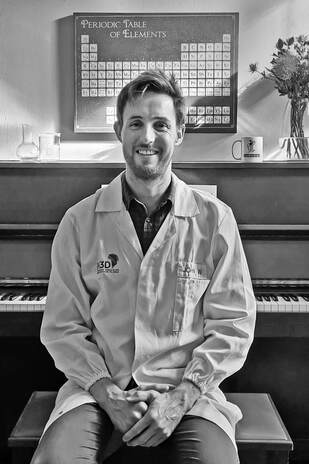Interviews
People of Note
On 31 January 2021, I was invited to appear on Classic 1027's People of Note with Richard Cock:
On 31 January 2021, I was invited to appear on Classic 1027's People of Note with Richard Cock:
PLAYLIST
1. Psalm 121 and Psalm 122 by Herbert Howells – Choir of King’s College, Cambridge (Stephen Cleobury)
2. Piano Concerto No. 2 (first movement) by Shostakovich – Leonard Bernstein (soloist and conductor), New York Philharmonic
3. Lux Aurumque ("Light and Gold") by Eric Whitacre – Polyphony (Stephen Layton)
4. Carillon by Herbert Murrill – Andrew Lucas (St Paul’s Cathedral, London)
5. In vino veritas by Paul Gibson – VOX Cape Town (John Woodland)
6. The Riddle Song from "Fancies" by John Rutter – Cambridge Singers, City of London Sinfonia (John Rutter)
7. By the Sleepy Lagoon by Eric Coates – Cape Town Proms Orchestra (Richard Cock, live recording from 2017)
8. Is My Team Ploughing? by George Butterworth – Bryn Terfel and Malcolm Martineau
9. Oxygen from "Inscape" – Isochronous (Vocals: Richard Brokensha)
10. Song for Athene by Sir John Tavener – The Choir of the Temple Church, The Holst Singers (Stephen Layton)
11. Codex from "The King of Limbs" – Radiohead
12. The Ring Goes South from "The Lord of the Rings" by Howard Shore – London Philharmonic Orchestra (Howard Shore)
13. The Fairy Garden from the Mother Goose Suite by Ravel – Katia and Marielle Labèque
14. Moon River arranged by Jacob Collier – Jacob Collier
1. Psalm 121 and Psalm 122 by Herbert Howells – Choir of King’s College, Cambridge (Stephen Cleobury)
2. Piano Concerto No. 2 (first movement) by Shostakovich – Leonard Bernstein (soloist and conductor), New York Philharmonic
3. Lux Aurumque ("Light and Gold") by Eric Whitacre – Polyphony (Stephen Layton)
4. Carillon by Herbert Murrill – Andrew Lucas (St Paul’s Cathedral, London)
5. In vino veritas by Paul Gibson – VOX Cape Town (John Woodland)
6. The Riddle Song from "Fancies" by John Rutter – Cambridge Singers, City of London Sinfonia (John Rutter)
7. By the Sleepy Lagoon by Eric Coates – Cape Town Proms Orchestra (Richard Cock, live recording from 2017)
8. Is My Team Ploughing? by George Butterworth – Bryn Terfel and Malcolm Martineau
9. Oxygen from "Inscape" – Isochronous (Vocals: Richard Brokensha)
10. Song for Athene by Sir John Tavener – The Choir of the Temple Church, The Holst Singers (Stephen Layton)
11. Codex from "The King of Limbs" – Radiohead
12. The Ring Goes South from "The Lord of the Rings" by Howard Shore – London Philharmonic Orchestra (Howard Shore)
13. The Fairy Garden from the Mother Goose Suite by Ravel – Katia and Marielle Labèque
14. Moon River arranged by Jacob Collier – Jacob Collier
Fine Music Radio's Opus
In December 2020, I was interviewed by Vanessa Levenstein for Opus, Fine Music Radio's monthly newsletter for members:
In December 2020, I was interviewed by Vanessa Levenstein for Opus, Fine Music Radio's monthly newsletter for members:
With a beaker in one hand and a baton in the other, scientist, conductor and FMR presenter John Woodland is FMR’s very own Alexander Borodin. What is the magic formula behind this man of many talents? |
